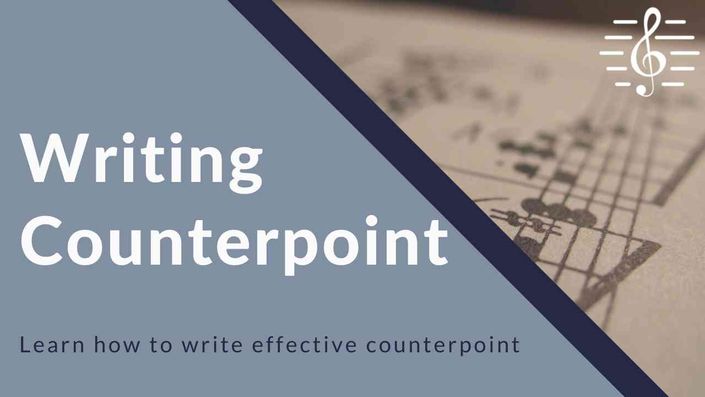
Writing Counterpoint
Transform your music composition skills and learn how to write and play effective counterpoint.
Enroll in Course
What You Will Learn
Discover the essential techniques that will enable you to understand, play and write counterpoint with the Writing Counterpoint course.
Counterpoint is the technique of writing independent melodic lines that weave together. It is among the core principles for writing music, and it has been central to the study of composition for many centuries. Many musicians are happy writing melodies and chords but when it comes to understanding and writing counterpoint they feel out of their depth. This course teaches you everything you need to know in order to understand, play and write effective counterpoint. During the Writing Counterpoint course we'll cover...
- Fundamental Principles - What exactly is counterpoint? How does counterpoint work? Who were the masters of counterpoint? What can we learn from them?
- Contrapuntal Devices - What is augmentation and diminution? What do we mean by inversion? What is retrograde? How do you incorporate these in your writing?
- Multiple Part Writing - How do you write in two parts? How do you write in three parts? What do you need to keep in mind when writing in multiple parts?
- Effective Counterpoint - How do you deal with harmony in polyphonic writing? What are the ways you can extend and develop points? How do you balance melodic conjunct movement with disjunct movement?
- Compositional Techniques - How do you combine homophonic and polyphonic writing? What are the stylistic elements you need to consider? How do you deal with short and long points?
With each lesson, I feel more complete and whole as a musician - so many gaps are being filled in, and so many new concepts introduced! And all presented in a way that is accessible and exciting. From the many comments others have left, it's obvious that a great many people share my feelings. Thank you so much again, and God bless!
- Paul

Who Is This Course For?
Next level composers and performers keen to engage with contrapuntal techniques.
The study of Counterpoint is essential knowledge for songwriters, composers, and musicians who want to strengthen their compositional skills. Students studying Counterpoint often find learning all this from text books rather dry and challenging. This course explains things step by step, with participants able to see and hear examples being written and constructed, the whole topic is presented in a practical way that is so much easier to grasp. Understanding counterpoint and how to use it effectively will level up your compositions and make your music more engaging and creative.
Do any of these sound familiar?
"I’m happy writing melodies and chords but Counterpoint defeats me..." "I need to write Counterpoint for my exam and need some help understanding how best to do it..." "I want to compose a fugue but I don't know where to start..." "I’m much happier sight reading and playing homophonic textures than I am polyphonic textures..." "I love the music of Bach and would like to understand more about how he writes..."
↓
Thank you for this. I have studied species counterpoint but that it is a more formal approach. It was helpful seeing you writing it and thinking out loud on how to solve problems you came across. It presents ideas on how one may approach contrapuntal writing.
- Benjamin

By the end of the Writing Counterpoint course you'll be able to…

Write and improvise Counterpoint using the standard techniques of imitation

Include augmentation, diminution, inversion, retrograde, and retrograde inversion

Blend polyphonic with homophonic passages

Work in any number of parts

Creatively extend and develop contrapuntal ideas

Understand how counterpoint works and how the great masters put it to use
I feel like I have discovered a goldmine! These videos are brilliant, thank you so much.
- Alice

Course Information
What's Included with the Writing Counterpoint Course?
Professional Teaching
You'll receive expert training, thoroughly enabling you to develop fluet contrapuntal writing technique.
Practical Exercises
Each video contains illustrative examples, working through the writing process and demonstrating what each example sounds like.
Ask Questions
Below each video you are able to post comments and ask questions should you have any in regards to the course topics covered.
Easy to Follow Structure
The course is divided into multiple stages, breaking down each part separately before putting it all together.
Complete at Your Own Pace
You can easily fit the course around your regular commitments, completing it at your own pace and in your own time.
Anywhere Access
Your course never expires. Learn when and where you choose! Computer or mobile. Just get comfortable and dive in!
↓
Your Instructor

Hi, I’m Gareth and I'm passionate about developing ‘the all round musician’.
Over 35 years of music examining with ABRSM, work with the BBC on Radio and TV, experience on the international concert platform, as a published composer and arranger, have brought rich resources to the 40 years of teaching in which I've engaged.
Scholarships at The Royal College of Music, Oxford University and St. Paul’s Cathedral gave me fantastic opportunities to learn from the best musicians, scholars and teachers. Working as Director of Music at Queen Elizabeth Grammar School then provided a wonderful opportunity to develop my teaching skills.
Teaching individuals and groups of all ages, and at all stages of development have refined a teaching approach that I hope is fun and engaging, and focused on explaining things clearly and logically. And that is what these courses are all about - understanding the basic principles with clarity, then going deeper, applying them to your musical life and liberating yourself as a musician.
It’s a rich and amazing journey, and I can’t wait for you to join me today!
Course Curriculum
-
StartLesson 1 - An Introduction to Counterpoint (18:42)
-
StartLesson 2 - Dealing with Short Points (22:53)
-
StartLesson 3 - Starting in a Lower Part, Dealing with Disjunct Movement and Developing the Initial Idea (12:59)
-
StartLesson 4 - Dealing with Longer Points (20:23)
-
StartLesson 5 - Counterpoint in Three Parts (20:21)
-
PreviewLesson 6 - Combining Counterpoint with Homophony (10:09)
-
StartLesson 7 - Counterpoint by Inversion (12:35)
-
StartLesson 8 - Counterpoint in Retrograde (7:55)
-
StartLesson 9 - Counterpoint in Retrograde Inversion (5:46)
-
StartLesson 10 - Counterpoint using Augmentation (7:32)
-
StartLesson 11 - Counterpoint using Diminution (8:10)
-
StartWriting Using a Short Point
-
StartWriting with a Point in the Lower Part
-
StartWriting Using a Longer Point
-
StartWriting in Three Parts
-
PreviewCombining Counterpoint with Homophony
-
StartWriting Counterpoint in Inversion
-
StartWriting Counterpoint in Retrograde Inversion
-
StartCounterpoint with Augmentation and Diminution
Frequently Asked Questions
A Letter from Gareth Green
MA (Oxon), MA (Leeds), FRCO(CHM), FLCM, ARCM
Why is it that so many musicians are more at home writing, improvising or playing homophonic music than they are polyphonic music?
The truth is that musicians often more readily think in terms of melodies and chords than we do in terms of linear textures. I’ve met players who are very happy to play a good number of Bach’s Preludes but who shy away from the Fugues. I’ve met composers who are very skilled at writing chordal textures but who regard Counterpoint as a mystery beyond their capability. Yet some of the richest music in our tradition is contrapuntal. In fact all part music written before the year 1600 was essentially contrapuntal and even when a stronger harmonic base to musical thinking emerged after 1600, Counterpoint has never since been abandoned.
Like many students of Counterpoint I was steeped in the art of 16th Century Counterpoint, which is often taught through Species Counterpoint. Some would describe this as “sad” but I loved Counterpoint studies at Oxford and relished blasting through exams featuring 100 bars of 5 part Counterpoint to be written in the style of Palestrina, Lassus, or Byrd. Nevertheless, many students live in fear of this approach, particularly if they are not keyboard players and are not sufficiently familiar with the repertoire of the sixteenth century.
This is why this course takes a fundamentally different approach. Stylistically, it draws inspiration from the Baroque rather than from the Renaissance period. Why? For three fundamental reasons. First, Baroque style is much more familiar to most people. Second, Baroque Counterpoint is free of many of the constraints of Renaissance Counterpoint. Third, the style of music written between 1600 and 1900 fundamentally belongs to a set of common musical principles which are significantly different from those that applied prior to the Baroque. Even though musical style evolved in new directions, particularly after 1900, the principles of Counterpoint remain essentially unchanged. Therefore, a Baroque based approach is much more accessible and arguably much more useful to most musicians..
In conclusion, if you would like to acquire Counterpoint skills and maybe have shied away to date or have got bogged down in heavy duty text books, this letter is an invitation to you to join me on a very practical journey that will enable you to think, write, or play in a Contrapuntal style. I do not claim that this course covers everything you would ever wish to know about Counterpoint - that is a lifetime study. What I do promise you is that this course is grounded in essential techniques that will build your confidence and get you moving in understanding, writing and playing Counterpoint.
— Gareth Green, Music Matters




